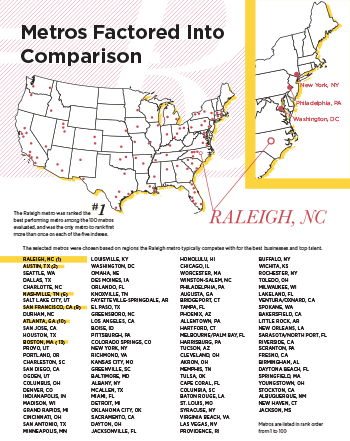The Raleigh metro is a major competitor both on a national and global scale. It is home to a diverse population of both industry and people, our community has a strong business climate, a workforce of highly educated professionals, and a quality of life that is hard to beat. These are all things that we know and celebrate in our community and the greater region. So how does the Raleigh metro stack up against other competitors? This year’s annual Metro Comparison publication shows the Raleigh metro tops the rankings as the most competitive metro in the U.S.
In past years, the annual Metro Comparisons overview has measured the Raleigh metro to 32 other metro competitors. This year, we looked at how the Raleigh metro faired compared to 100 of the largest metros in the U.S. The study looks at indexes like talent, cost of doing business, momentum, and future. All key areas of focus for the quickly growing metro. The data is analyzed and compared to five other competitor metros: Austin, Nashville, San Francisco, Atlanta, and Boston. The goal of the direct comparison is to show the strength of the Raleigh metro and how it stacks up to some of the largest metros in the U.S.
The study revealed that, although the Raleigh metro is smaller than some of its competitors, it consistently outperforms and outpaces other larger metros in many of the metrics used in the study. Below you’ll find a few supporting key points that show why the Raleigh metro is ranked the number one best performing metro in the U.S.:
- The Local Talent Pool is Deep
- One of the key differentiators for the Raleigh metro is the access and abundance of highly educated and skilled talent. Nearly 50 percent of the existing population in the Raleigh metro has a bachelor’s degree or higher and 68 percent of new residents have a bachelor’s degree or higher. That is more than double the national average!
- Low Cost High Return
- Raleigh metro’s low cost of doing business has helped existing companies thrive and has attracted new companies to the market. With a low cost of doing business (five percent below the national average), companies see this as a huge advantage when relocating or expanding their business.
- Fast and Smart Growth
- The metro continues to grow by 64 people per day, with 43 moving to the area and 21 being born. Experts predict that in the next 10 years, the Raleigh metro is projected to grow by 24 percent. The future of the Raleigh metro is certainly bright.
- Laser Focus on the Future
- Planning for growth continues to be a focus for the Raleigh metro. With a diverse industry base and a high concentration of fast growing companies, the Raleigh metro is focused on economic mobility and preparing for advances in transit, infrastructure, and development.
The Metro Comparison is a document available to you to help tell the story of our community and the greater region. You can download your copy of the comparison here. If you have questions, please contact Morgan Ross.

Comments
There are no comments yet.
Leave a Comment